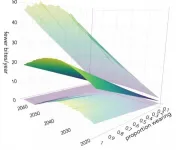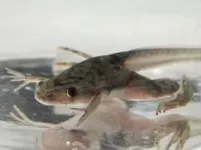(Press-News.org) With shark bites increasing in countries like Australia - scientists say the use of personal electronic deterrents is an effective way to prevent future deaths and injuries which could save the lives of up to 1063 Australians along the coastline over the next 50 years.
The research, published in scientific journal Royal Society Open Science, shows that while shark bites are rare events, strategies to reduce shark-bite risk are also valuable because they can severely affect victims and their support groups - with one third of victims experiencing post-traumatic stress disorder.
The researchers analysed per-capita shark bites around Australia from 1900 to 2020 and developed models to estimate the preventative impact of electronic deterrents if they were worn by water users, to predict how many shark bites could be avoided.
With the incidence of bites increasing worldwide, researchers used the Australian Shark Attack File curated by Taronga Conservation Society Australia to develop the models of incidents, and then projected these shark bites to 2066 when the population is expected to rise to 49 million.
There were 985 incidents reported in the Australian Shark Attack File from 1900 to 2020 from 20 different species.
Lead author Professor Corey Bradshaw of Flinders University says efforts to reduce the risk of shark bites, even if they are extremely rare, are valuable with electronic deterrents capable of reducing the likelihood of a bite by about 60%, potentially saving hundreds of lives over the next 50 years.
"Avoiding death, injury, and trauma from shark bites over the next half-century would be a realistic outcome if people use these personal electronic deterrents whenever they're in the water, and as long as the technology is operating at capacity."
"Given that governments are applying multiple approaches to mitigate shark bites such as drones, SMART drumlines, and acoustic monitoring, our simulations suggest electronic deterrents could make a valuable contribution to overall mitigation, and so help allay community fears."
"This is especially so when you consider the additional costs associated with the loss of recreational, commercial, and tourism revenue in the tens to hundreds of millions of dollars following clusters of shark-bite events. "
"For example, the New South Wales Government recently invested AU$16 million to mitigate shark bites in part due to lost revenue from businesses benefitting from water users and tourism."
Despite the low probability of being bitten by a shark, the rising number of people spending time in waters frequented by sharks increase shark-bite risk to an extent.
The researchers point out this approach relies on many assumptions, the biggest factors being stability in the abundance of sharks, shark behaviour, shark distribution (potentially influenced by climate), and human use of the ocean.
Shark scientist and co-author Associate Professor Charlie Huveneers, who leads the Southern Shark Ecology Group at Flinders University, says the electronic deterrent devices can be beneficial, as long as people understand their effectiveness and how much they actually reduce the risk of attacks.
"Although several studies have demonstrated that electronic deterrents can reduce the probability of shark bites, device efficacy varies among manufacturers and even between products of the same manufacturer."
"When testing these products scientifically, we need a large number of interactions to (i.e., using robust statistics) assess efficacy confidently. As a result, we often need to use bait or berley to attract sharks, which likely motivate sharks to bite more than in situations when sharks encounter a swimmer or surfer."
"Therefore, the ability of electric deterrents to reduce shark bite risk might be greater than the 60% decrease we observed in our studies, further increasing the number of lives saved."
INFORMATION:
The paper by Corey Bradshaw, Phoebe Meagher, Madeline Thiele, Robert Harcourt and Charlie Huveneers (2021) is 'Predicting potential future reduction in shark bites'. Royal Society Open Science 8: 201197. doi:10.1098/rsos.201197
Heart attacks in young adults are twice as likely to be fatal in those with inflammatory conditions like psoriasis, lupus or rheumatoid arthritis. That's the finding of a study published today in the European Journal of Preventive Cardiology, a journal of the European Society of Cardiology (ESC).1
At least 2% of people in Europe and worldwide have systemic inflammatory diseases, which often affect multiple organ systems. Many of these systemic inflammatory diseases are driven by autoimmunity, meaning the body's immune system attacks itself. Psoriasis is the most common and causes red, itchy, scaly patches on the skin, and can also cause inflammation in the joints. Rheumatoid arthritis leads to inflammation in joints of the hands and feet and in other organ systems. In systemic ...
Red algae that grow in Cornwall's Fal Estuary are genetically unique, new research shows.
University of Exeter scientists studied the population genetics of Phymatolithon calcareum, a coralline red algal species that forms maerl beds in shallow coastal seas from Portugal to Norway.
Large maerl beds fulfil a similar role to tropical coral reefs, providing habitats and vital shelter for hundreds or even thousands of fish and invertebrates. These algae also play an important role in storing carbon.
The findings reveal genetic differences are "structured geographically", with slight variations between populations sampled from across this large geographic area.
However, maerl ...
Human disturbance in urban environments makes some squirrels fail, but others perform better in novel problem-solving.
Unlike natural environments, urban areas have artificial buildings, traffics, less greenery and, most prominently, more humans. Despite these seemingly 'harsh' or stressful characteristics, some wildlife like the Eurasian red squirrel have chosen to settle down in urban environments, and they thrive. Urban wildlife often show higher behavioral flexibility and increased ability to solve novel problems, and thus can exploit new resources. However, which characteristics of urban environments influence animals' performance, and their relative importance, have remained ...
Scientists have discovered a new genetic disease, which causes some children's brains to develop abnormally, resulting in delayed intellectual development and often early onset cataracts.
The majority of patients with the condition, which is so new it doesn't have a name yet, were also microcephalic, a birth defect where a baby's head is smaller than expected when compared to babies of the same sex and age.
Researchers from the universities of Portsmouth and Southampton found that changes in a gene called coat protein complex 1 (COPB1) caused this rare genetic disease.
Now the variant has been identified, it will help clinicians come up with targeted interventions to help patients and their families, also opening the door to screening and prenatal ...
A new study examining how people with severe and profound intellectual disabilities resist activities while in care recommends that institutions improve training to help carers better understand non-verbal cues, as well as offer greater flexibility to allow individual preferences to take priority over institutional schedules.
The research, published in the journal Sociology of Health and Illness, investigated how people with limited language ability expressed their wishes and preferences, and how their support workers responded. It was carried out at a residential home and a day care centre in the UK.
The study, by Dr Clare Nicholson of St Mary's University, Twickenham, and Dr Mick ...
In the run up to hibernation, grizzly bears go on a colossal binge, consuming as many calories as possible to get them through the long winter. Yet, little was known about how much energy the massive mammals use as they shamble around their rugged territories. 'Moving across the landscape in search of food can be a huge energetic expense for some animals', Carnahan says. Fortunately, the Washington State University Bear Research, Education and Conservation Center (WSU BREC), where Carnahan is based, is home to 11 bears, including four that formerly lived in Yellowstone National Park, so he and Charles Robbins (also at WSU BREC) decided to measure the animals' metabolic rates as they sauntered on the flat, and up and down gradients to find out how much ...
New research published in Anaesthesia (a journal of the Association of Anaesthetists) challenges the guidance that special aerosol precautions are only needed when using oxygen therapies for COVID-19 patients, and raises concerns about safety of staff and patients on hospital wards, if they are not protected from infectious aerosols.
The study set out to examine whether oxygen therapies used for patients with severe COVID-19 produce large amounts of small respiratory particles called aerosols, which can transmit virus and can evade routine precautions used on hospital wards. ...
Rock art of human figures created over thousands of years in Australia's Arnhem Land has been put through a transformative machine learning study to analyse style changes over the years.
The study has tested different styles labelled 'Northern Running figures', 'Dynamic figures', 'Post Dynamic figures' and 'Simple figures with Boomerangs' to understand how these styles relate to one another.
Working with the Mimal and Marrku Traditional Owners of the Wilton River area in Australia's Top End, South Australian researchers led by Flinders University archaeologist Dr Daryl Wesley have taken a closer look at the art of this region.
Flinders researcher Jarrad Kowlessar and the team used machine learning ...
Highlights
A newly developed tool assesses patients' home dialysis experience.
The 26-item Home Dialysis Care Experience instrument will be a resource for future research use, clinical care, and quality improvement initiatives among home dialysis facilities and organizations.
Washington, DC (March 30, 2021) -- Researchers have developed a new tool to assess patients' opinions and experience concerning home dialysis care. The tool is described in an upcoming issue of CJASN.
Home dialysis, which includes both peritoneal dialysis and home hemodialysis, allows patients to receive their dialysis treatments at home, gives patients independence and flexibility ...
BOSTON - COVID-19 can have damaging effects on multiple organs in the body, including the brain. A new study led by investigators at Massachusetts General Hospital (MGH) and Beth Israel Deaconess Medical Center (BIDMC) indicates that some hospitalized patients with COVID-19 experience non-convulsive seizures, which may put them at a higher risk of dying. The findings are published in the Annals of Neurology.
"Seizures are a very common complication of severe critical illness. Most of these seizures are not obvious: Unlike seizures that make a person fall down and shake, or convulse, ...



